Karmenu Vella appointed EU Environment Commissioner
Maltese politician and former Tourism Minister Karmenu Vella has been appointed as the new European Commissioner for Environment, Maritime Affairs and Fisheries.
The President-elect of the European Commission (EC), Jean-Claude Juncker, announced his new Commissioners-designate this morning (10 September), which includes a ‘streamlining’ of posts to ‘focus on tackling the big political challenges Europe is facing: getting people back to work in decent jobs, triggering more investment, making sure banks lend to the real economy again, creating a connected digital market, a credible foreign policy and ensuring Europe stands on its own feet when it comes to energy security’.
The team, which will come into power on 1 November, includes five former prime ministers, four deputy prime ministers, 19 former ministers, seven returning commissioners, and eight former members of the European Parliament.
‘Protecting the environment and maintaining our competitiveness have to go hand-in-hand’
Replacing outgoing Environment Commissioner Janez Potočnik, is Karmenu Vella, who has been awarded responsibility for not only the environment, but also maritime affairs and fisheries to ‘reflect the twin logic of "Blue" and "Green" Growth’ in just one instance of the ‘reshaping’ and ‘streamlining’ of portfolios.
According to the EC, ‘environment and maritime conservation policies can and should play a key role in creating jobs, preserving resources, stimulating growth and encouraging investment. Protecting the environment and maintaining our competitiveness have to go hand-in-hand – both are about a sustainable future’. The work dealing with food waste and that of biocides, however, will move from the Directorate General of the Environment to the Directorate General of Health and Consumers (SANCO).
Similarly, there will also be just one Commissioner for Climate Action and Energy policy, Spanish policitian Miguel Arias Cañete.
The EC said that ‘strengthening the share of renewable energies is not only a matter of a responsible climate change policy. It is, at the same time, an industrial policy imperative if Europe still wants to have affordable energy in the medium term’.
The new College of Commissioners also includes seven vice-presidents, six of which (in addition to the High Representative of the Union for Foreign Policy and Security Policy Federica Mogherini), will be leading a project team and ‘steering and coordinating the work of a number of commissioners’.
These project teams mirror the ‘Political Guidelines’ of Juncker’s new commission, and include: ‘Jobs, Growth, Investment and Competitiveness’; ‘Digital Single Market’; and ‘Energy Union’.
Both Vella and Cañete’s portfolios will contribute to the Project Team ‘Energy Union’, steered and coordinated by Alenka Bratušek.
‘No first or second-class commissioners’
It is hoped that the new structure will ‘ensure a dynamic interaction of all members of the College, breaking down silos and moving away from static structures’.
Juncker commented: "In the new commission, there are no first or second-class commissioners – there are team leaders and team players. They will work together in a spirit of collegiality and mutual dependence. I want to overcome silo-mentalities and introduce a new collaborative way of working in areas where Europe can really make a difference."
The President-elect reportedly interviewed all Commissioners-designate himself and is ‘convinced that his strong and experienced team can deliver, by working collectively, in a more efficient way’.
Juncker said: "In these unprecedented times, Europe's citizens expect us to deliver. After years of economic hardship and often painful reforms, Europeans expect a performing economy, sustainable jobs, more social protection, safer borders, energy security and digital opportunities. Today, I am presenting the team that will put Europe back on the path to jobs and growth.
“In the new European Commission, form follows function. We have to be open to change. We have to show that the commission can change. What I present to you today is a political, dynamic and effective European Commission, geared to give Europe its new start. I have given portfolios to people – not to countries. I am putting 27 players in the field, each of whom has a specific role to play – this is my winning team."
Other notable positions include:
- A First Vice-President, Frans Timmermans, has been appointed to be the ‘right-hand’ of the President and will be responsible for the ‘Better Regulation’ agenda, which aims to ensure ‘every [European] Commission proposal is truly required and that the aims cannot best be achieved by member states’. The First Vice-President will also act as a watchdog, upholding the Charter of Fundamental Rights and the Rule of Law in all of the EC's activities;
- A new Internal Market, Industry, Entrepreneurship and SME portfolio, under Elžbieta Bieńkowska, will drive the ‘real economy’;
- The new Economic and Financial Affairs, Taxation and Customs portfolio, under Pierre Moscovici, will ‘ensure that taxation and customs union policies become part and parcel of a deep and genuine Economic and Monetary Union and contribute to the smooth functioning of the overall economic governance framework of the EU’;
- The portfolios for justice, consumers and gender equality have been streamlined into one post, held by Věra Jourová;
- A new Commissioner for Migration, Dimitris Avramopoulos, will work to ‘prioritise a new policy on migration that will robustly tackle irregular migration, whilst at the same time making Europe an attractive destination for top talent’.
- A new Financial Stability, Financial Services and Capital Markets Union portfolio, under Jonathan Hill, will ‘focus the existing expertise and responsibility in one place, a newly created Directorate-General, and ensure the commission remains active and vigilant in implementing the new supervisory and resolution rules for banks’.
There are nine female and 19 male members of the Juncker Commission and three of the seven vice-presidents are women.
Opportunity to 'send a clear and hopefully positive message about the development of the circular economy'
Jeremy Wates, Secretary General of the European Environment Bureau, lambasted the decision to merge the environment portfolio with others, saying: “Instead of putting sustainability central to his new team, Juncker has decided to relegate it to the margins by scrapping the dedicated posts of a climate and an environment commissioner and appointing a deregulation first Vice-President to put a competitiveness filter on all initiatives.
“Under a banner of reform, a deeply regressive deregulatory agenda has been put forward here that reads like a wish-list of private sector interest groups hostile to the environment.”
Ray Georgeson, Chief Executive of the Resource Association, also commented, saying: “We welcome the new Commissioner Vella to his post and urge him to signal clearly and quickly his intentions towards his predecessors’ Circular Economy package. Any new incumbent must be given time to master their portfolio but clearly there is an opportunity here to minimise uncertainty and send a clear and hopefully positive message about the development of the circular economy.
“The mood music about the new Commission today from the environment sector however has not been good, and the merging of Energy and Climate Change and what looks like a weakening of DG Environment by adding other responsibilities may be sending the wrong message, especially seen in the light of other changes in the Commission that point towards a more deregulatory approach. It will be a real pity if the circular economy package becomes an early casualty - it is clear to so many of us that there are huge and necessary environmental and economic benefits to be realised from a more circular economy and that this will only come with intelligent intervention, regulation and market signalling by Member States, led by the EU.”
He added: “As Commission President Juncker has asked for the circular economy package to be reviewed early, we sincerely hope that new Commissioner Vella can react quickly and pick up the baton handed to him by Commissioner Potocnik with vigour.”
The European Parliament now has to give its consent to the entire College of Commissioners. Once the European Parliament has given its consent, the European Council will formally appoint the European Commission.
Read more about Juncker’s College of Commissioners or his Political Guidelines.












